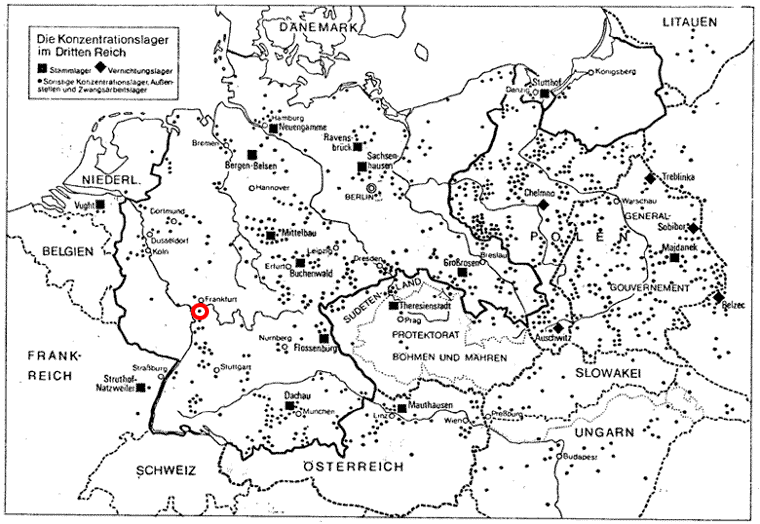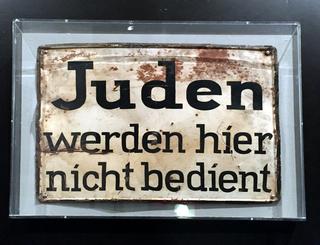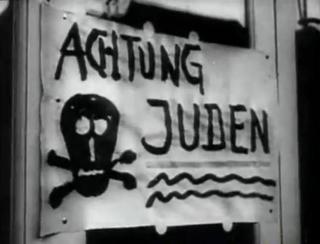Go  | New  | Find  | Notify  | Tools  | Reply  |  |
| Res ipsa loquitur |
I had a boss who escaped from Dachau. He never did say much but he did explain his escape one day at work. __________________________ | |||
|
Republican in training |
Do you get mad when you see a Volkswagen? -------------------- I like Sigs and HK's, and maybe Glocks | |||
|
Member |
Dachau wasn't in the same league as the death camps in Poland. Just worlds apart in scale and purpose. So how exactly would normal, every day Germans in Germany proper know about the real death factories that only existed in Poland, hundreds of kilometers from the easternmost areas of Germany? There was no free press, getting caught listening to foreign radio stations was punishable by death, no one was ever released from a death camp to tell their tale and, well, those camps were all in occupied Poland, nowhere near Germany. Unless you had family members working at one of those camps and talking about it when home on leave, how could you possibly know about them? I have met plenty of Germans of that era, who had never been more than 50 km. away from the village where they were born, until long after the war. How would they have known? And furthermore, what would they have done, living in the middle of nowhere, with no way to even communicate with others in urban areas? | |||
|
| Go ahead punk, make my day |
No, why would I? There ain't much that gets me 'mad'. | |||
|
| Member |
German townfolk in the countryside admitted that they could smell the stench of burning flesh for miles. While there was no open talk of it people knew from rumours, loose talk of guards and officials and from those who could smell the stench. Word traveled. People lived in denial. | |||
|
| Staring back from the abyss |
I'd suggest doing a little research before spewing your anti-Catholic bullshit. If the Church is guilty of anything during WW2, it's in not saving more Jews than they did. But I guess nearly a million is not enough for you, huh? ________________________________________________________ "Great danger lies in the notion that we can reason with evil." Doug Patton. | |||
|
| SIGforum's Berlin Correspondent  |
The distinction between the "regular" KZs and the dedicated extermination camps that has been noted throughout the debate is important. Organizationally, the Inspectorate of Concentration Camps was under the SS Main Office of Economy and Administration while the extermination camps were run through the Higher SS and Police Commanders in the occupied East European countries. The difference is indicative for how both types were run. The purpose of the regular KZs was economic gain with not the mere acceptance, but the full expectation that inmates would eventually die of exhaustation, or else be disposed off- or on-site, or shipped off to the extermination camps if they were of no more use. The purpose was not to starve them as slowly as possible, nor to keep them alive for work, but rather, in these precise word, "destruction through work". I. e., they were fed the bare minimum to keep a human being alive under the best of circumstances, but worked as hard as possible. I can't cite a source but suspect that somebody somewhere made very careful calculations about the optimum point where you get the maximum work out of prisoners with minimum upkeep until they die; after all there were actually sick bays in KZs, so at least some pretense of caring for the health of the inmates was made - but obviously nothing that would detract from the overall cost-benefit balance. As noted, KZ population was heterogenuous - Jews, gipsies, Jehova's Witnesses, communists and other political enemies of the Nazis, political and plain criminal convicts, homosexuals, punishment referals from the general slave labor system (both from the occupied countries and Germans from the "re-education camps for the work-shy" run by the Gestapo) and some POWs; particularly Soviets, which were treated KZ-like even in Wehrmacht camps on the excuse that the USSR was not a signatory to the Geneva Conventions, but also interned soldiers of prior German allies who had switched sides late in the war, Italians, Romanians, etc. There may have been Germans who didn't know what went on in there in detail, but I have a hard time seeing that nobody knew. For starters, there were countless sub-camps and off-camp work details spread all over Germany; true to the economic aim, prisoners were hired out to businesses as cheap labor and to make up for the shortfall of manpower due to the war effort. This is of course depicted in "Schindler's List". My hometown of (today) 10,000 had a sub-camp of Buchenwald from 1944, holding about 750 mostly Hungarian Jewish women relocated from Bergen-Belsen who had to work in a local ammunition plant. See map of camps and sub-camps below.  Sometimes an off-camp detail might just have been a couple dozen KZ prisoners held in a factory's basement, guarded by local personnel. They were working alongside regular and conscripted German staff, forced laborers from the occupied countries and POWs. If you lived near a camp or sub-camp, you had an excellent chance of seeing work details being marched to work in quarries, cut wood, etc.; the threat of being sentenced to a KZ stay for political or criminal offenses was a known reality for Germans themselves, and those were sometimes finite sentences after which people were released to return home, just like from prison. I'll allow that even locals were probably genuinely shocked at the post-war images of masses of skeletonized and charred bodies inside the wire of the main camps; particularly since a lot of those were the results of hasty attempts to clean up as the military fronts approached in the last days. But even "normal" operation produced a continuous stream of dead from malnourishment, exhaustion, sickness, mistreatment and execution, with the attendant crematorium smoke and mass graves which would give outsiders some suggestion of what happened inside. The dedicated extermination camps were of course mostly installed outside Germany with the intent to shield what was going on there from the home population - though as noted, people might see prisoners being loaded onto trains and transported east (certainly railway staff did), there were soldiers and other personnel going on leave from the areas they operated in, etc. These were relatively small camps, with maybe a couple dozen German staff, guards often recruited/conscripted from the occupied countries, and limited holding space just for those arrivals who were forced to do the actual manual labor associated with the killing and disposal of bodies before being killed off themselves. These were mostly racial undesirables like Jews and gipsies. Auschwitz technically violated the "outside Germany" rule since the area was actually annexed into Germany proper, but as some have pointed out, the site was a hybrid with several separate camps; the original Auschwitz I from 1940 was a "regular" KZ, while Auschwitz II (Birkenau) was a model death camp built in 1941, and Auschwitz III (Monowitz) was another work camp specifically built for the IG Farben chemical works. There were about 50 sub-camps, plus co-located non-KZ camps for POWs etc.; mostly for Soviets, though some British prisoners were also held there and made to work at IG Farben in a rare breach of the Geneva Conventions regarding Western allied POWs. Except for the death camp, this co-location of different types was not unusual, since as depicted above, prisoners from different organizations would work together at the same plants. | |||
|
Member |
Yes indeed many Catholic priests and bishops did save many Jews. That said, Church officials also ran the 'rat lines' used by fleeing Nazis after the war to escape to Spain, South America, and the Middle East. These were the same rat lines that were used to help Jews escape Europe during the war. But, Vatican officials had full knowledge of what the Germans were doing during the war. They turned a blind eye after Mussolini fell and the Germans took control of Italy. The Germans began to round up Italian Jews and ship them to The Fatherland via rail through Switzerland. The Swiss also turned and looked the other way as these death trains proceeded though their territory. Vatican City became an independent state in 1929 under Mussolini and Church officials did not want to lose their independent status after the Germans took control of Italy. Swiss banks were holding the wealth of the murdered Jews that German officials had deposited there. They weren't about to risk losing those deposits. “Elections have consequences, and at the end of the day, I won.” – Barack Hussein Obama, January 23, 2009 | |||
|
Member |
I think most Germans knew what was going on.... I read somewhere that it took around 6,000 people to run just one concentration/slave camp. Do you really think it could be kept secret. But here was the real issue with that.... you had a choice, we always do, which side of the fence do you and your family want to be on? It is not quite as easy when it is real. My Native American Name: "Runs with Scissors" | |||
|
| Member |
Murder is messy. | |||
|
| Member |
Atrocities against others has been occurring for many centuries. What happened during the Nazi regime was horrendous and shocking because it was a media event and the numbers were documented and it was premeditated on a large scale. However, the numbers were not so well documented for other events that were spread out over a longer time scale or population. What happened to the east coast native Americans? Where did they go and who was responsible? -------------------------------- On the inside looking out, but not to the west, it's the PRK and its minions! | |||
|
Fighting the good fight |
It's estimated that approximately 7,000 different staff served at Auschwitz, the largest of the camps, during its years of operations from 1940-1945. That's not all at once, though. Staff were rotated in and out. That wasn't the norm, though. Other well-known camps, like Belzen and Treblinka, had approximately 100-150 staff during their years of operation. There were around 70 larger camps plus thousands more smaller camps. Most of these larger camps were nowhere near the size of Auschwitz and only had a staff of a few dozen to a couple hundred. Many of the smaller camps had only a few prisoners and a handful of staff. Plus, not all of the staff were German. A large percentage of the staff at concentration camps were Russian/Ukrainian/Polish/Italian/Croatian/etc. collaborators. | |||
|
| Member |
I believe there were also many types of "medical experiments" being done on human test subjects. I think many of the researchers were given immunity in exchange for the all the data they obtain during the experiments. Most of the experiments would never be permitted on human subjects. | |||
|
Official Space Nerd |
I have a book called "Ordinary Citizens" (IIRC) that I haven 't read yet that discusses what roles the 'average Germans' played in the Holocaust. I believe many Germans really did not know what was going on. You must remember that nazi Germany did NOT have a free press, and citizens did NOT have the right to question their govt (it was a police state, after all). However, I would bet the vast majority of citizens would claim 'they did not know,' just as every camp guard 'was just following orders.' Even Franz Stangl (mentioned above) claimed he "never killed anybody," and he was just there to protect govt property. Germans knew what went on. Not every single one, but a LOT of them. But, even if they knew, what would they do? If they blabbed, they would get shipped off to Dachau. What do we think their options were? Speak out anyway and then die on principle? If so, what of their families? We CANNOT apply the freedoms we have today to their situation. I don't see what Japan has to do with this conversation. Yes, they committed atrocities. I just don't see relevance. As for the ILLEGAL imprisonment of US CITIZENS in WW2, that is similar to, but not the same as, German camps. It was a blatant violation of civil rights. It was a national disgrace. Many people DIED there that would not have if we had left them live free. Fear God and Dread Nought Admiral of the Fleet Sir Jacky Fisher | |||
|
| Member |
I have ready fairly extensively about WW2, inc. the death camps. My understanding mirror's maxdog's comments. Gossip spreads, and it was widely rumored that Jews and others were being killed in extremely large numbers. I have also read that some of the gossip reached the UK during the war, probably from commando's returning to England, or people that escaped. I do not see how the death camps could have been stopped though. The allies had their hands full, and did the best they possibly could. One of the most interesting books I have ever read was "I Cannot Forgive", written by one of one of the few persons to ever escape Auschwitz. -c1steve | |||
|
| Charmingly unsophisticated |
 Going to Dachau was an experience I don't think I'd care to repeat. I went as part of a "field trip" with my mech infantry company. As you might imagine, we were pretty boisterous on the bus ride there, despite having been told by our leadership what Dachau was and what it represented. As others have pointed out, there is a 'feeling' there that quickly asserts itself. I can't imagine what Auschwitz or the other places must be like, even torn down. _______________________________ The artist formerly known as AllenInWV | |||
|
Ammoholic |
The idea that it wasn't known is ludicrous. It was, did ever SS typist or communications officer know, no, but word spreads pretty quickly almost as quickly as the smell burning flesh and mass graves.   You can't tell me people didn't know something was up and that their neighbors were disappearing. The Nazi's normalized the hatred of the Jews and made pretty clear what their final goal was. Reichstag Speech - Jan 30, 1939 This is prewar and he's already stated that his goal is "the annihilation of the Jewish race in Europe." Link to original video: https://youtu.be/GPXPjZurupc Jesse Sic Semper Tyrannis | |||
|
Official Space Nerd |
The allies knew about the Holocaust, but what could they do? Bomb Auschwitz, wiping out the camp and killing every man, woman, and child there? The allied plan for stopping the Holocaust was "Win The War As Soon As Possible." Fear God and Dread Nought Admiral of the Fleet Sir Jacky Fisher | |||
|
| Go ahead punk, make my day |
This "The German People DIDN'T KNOW ANYTHING" argument is as convincing as the "The Southern State seceding from the Union had NOTHING TO DO WITH SLAVERY, AT ALL" argument. Both are completely full of shit. | |||
|
| Why don’t you fix your little problem and light this candle |
If interested a unique treatement of the topic, and overall tells the story leading to the final solution is "The good old days" by Ernst Klee [URL=The Good Old Days: The Holocaust as Seen by Its Perpetrators and Bystanders https://www.amazon.com/dp/1568...Cb16QTXA9]Link[/url] It directly answers your question (in my opinion). From the realization that normal, same people (soldiers) could not just be ordered to kill innocent people. It was a bizarre process of experimentation and strategic study, leading to the death camps. I read it in school and it is one of those books that while reading it changed me and how I saw the world . BTW the title is taken from a cover of a scrapbook of the administrator of one of the camps. This business will get out of control. It will get out of control and we'll be lucky to live through it. -Rear Admiral (Lower Half) Joshua Painter Played by Senator Fred Thompson | |||
|
| Powered by Social Strata | Page 1 2 3 4 5 6 7 |
| Please Wait. Your request is being processed... |
|
© SIGforum 2024